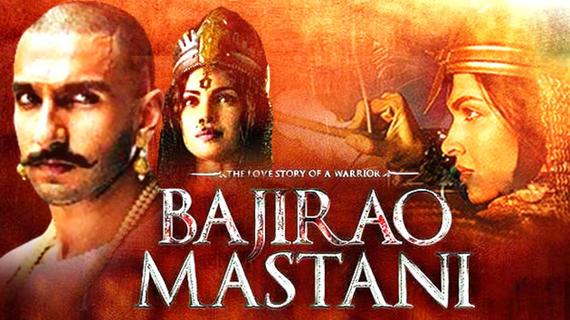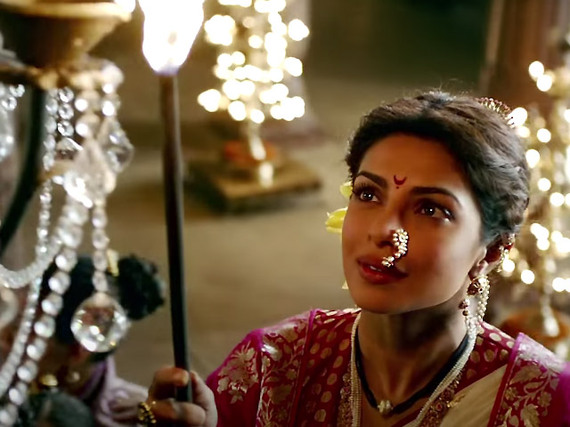While the world debates the historical accuracy (or the lack of it) of Bajirao Mastani or cribs about its not-so-strong script or disses its elaborate song-and-dance sequences, there's much to be celebrated about the film if we delve a little deeper.
Image may be NSFW.
Clik here to view.
Bajirao Mastani is undoubtedly one of the most progressive films Bollywood has churned out this year. Sounds contrary? Considering it is set in 18th century India? But that's what it is, and therein lies the film's uniqueness. No matter how decorated the women in the film are -- and they are rather heavily decorated -- they are much more than just pretty objects housed in prettier palaces.
We're not sure if Peshwa Bajirao was this progressive, liberal and feminist a man or this is how director Sanjay Leela Bhansali interpreted him to be. But what we see in the film is an 18th-century Maratha warrior who not only loves his women dearly but also goes out of his way to give them the respect and position they deserve. He declares that he has loved Mastani, as opposed to just using her for pleasure ("Bajirao ne Mastani se mohabbat kiya hai, aiyyaashi nahi.").
He makes it clear that his fight against the Nizam down south is with the man and not his religion, thus rising above the petty politics of faith that defines his times, and sadly, ours too. He even goes against his overbearing mother -- who's perennially opposed to his union with the half-Muslim Mastani -- until she concedes, "Garv hota hai ke tum mere bete ho... aurat ko samman dena jante ho (I'm proud you're my son... you know how to respect women)."
Image may be NSFW.
Clik here to view.
He's sensitive too and realises that he's hurt his first wife, Kashibai (played brilliantly by Priyanka Chopra), and has left her lonely. "Maine tumhe akela kar diya hai na, Kashi?" he asks. He isn't faking concern here. He's genuinely torn between the two women. He loves them both. One is his inspiration (prerna) and the other his strength (taakat). And when his strength, Kashibai, bars him from visiting her, he obliges no matter how reluctantly. He "allows" his woman the space to reprimand him; he "allows" her an expression of hurt; he "allows" her to act the way she wants. There's no rage, there's no opposition, there's no sending her away to the maika. He is tolerant, if I may say, of his wife's dissent. And that is refreshing to see.
One of the film's finest scenes is enacted by Priyanka Chopra and Tanvi Azmi (an actor par excellence, who plays Bajirao's mother). It is a scene that is so contemporary in texture and flavour that it is almost impossible to believe that these women belonged to the 1700s. Chopra and Azmi share a crackling laughter that is dripping with pain and despair as they lament their destinies. It is a chemistry so beautifully modern, where mother-in-law and daughter-in-law are unafraid of free expression in each other's presence. The two actors are so warm and easy that they could well have been friends laughing about a random guy. I wish the film had dedicated a few more minutes to their bonding.
Image may be NSFW.
Clik here to view.
And then there's Mastani, the brave, free-spirited, warrior princess who is the architect of her own fate. "Mastani apni taqdeer khud likhti hai," she asserts. She's unrelenting in her love for Bajirao; she desires her man and expresses it in ways more than 18th century rule-books would allow. She is the fighter as well as the nurturer as depicted in another of the film's top scenes where Mastani sword-fights her enemies while her little son is clenched to her bosom. She is so much the modern mother here -- the 21st century "supermom" -- who has to fend for herself and her child when the husband's away.
As I said earlier we don't know how Mastani was in reality, or how Kashibai was for that matter, but the fact that Mr Bhansali has empowered his women with such unfettered spirit, grace and magnanimity (one word that would define Kashibai) and the man with such sensitivity and large-heartedness, is worth applauding.
Especially when "deti hai toh de varna kat le" has taken over public consciousness.
This post originally appeared here.
Image may be NSFW.
Clik here to view.![]() Like Us On Facebook |
Like Us On Facebook |
Image may be NSFW.
Clik here to view.![]() Follow Us On Twitter |
Follow Us On Twitter |
Image may be NSFW.
Clik here to view.![]() Contact HuffPost India
Contact HuffPost India
Also see on HuffPost:
Image may be NSFW.
Clik here to view.

Bajirao Mastani is undoubtedly one of the most progressive films Bollywood has churned out this year. Sounds contrary? Considering it is set in 18th century India? But that's what it is, and therein lies the film's uniqueness. No matter how decorated the women in the film are -- and they are rather heavily decorated -- they are much more than just pretty objects housed in prettier palaces.
He "allows" his woman the space to reprimand him; he "allows" her an expression of hurt; he "allows" her to act the way she wants.
We're not sure if Peshwa Bajirao was this progressive, liberal and feminist a man or this is how director Sanjay Leela Bhansali interpreted him to be. But what we see in the film is an 18th-century Maratha warrior who not only loves his women dearly but also goes out of his way to give them the respect and position they deserve. He declares that he has loved Mastani, as opposed to just using her for pleasure ("Bajirao ne Mastani se mohabbat kiya hai, aiyyaashi nahi.").
He makes it clear that his fight against the Nizam down south is with the man and not his religion, thus rising above the petty politics of faith that defines his times, and sadly, ours too. He even goes against his overbearing mother -- who's perennially opposed to his union with the half-Muslim Mastani -- until she concedes, "Garv hota hai ke tum mere bete ho... aurat ko samman dena jante ho (I'm proud you're my son... you know how to respect women)."
Image may be NSFW.
Clik here to view.

He's sensitive too and realises that he's hurt his first wife, Kashibai (played brilliantly by Priyanka Chopra), and has left her lonely. "Maine tumhe akela kar diya hai na, Kashi?" he asks. He isn't faking concern here. He's genuinely torn between the two women. He loves them both. One is his inspiration (prerna) and the other his strength (taakat). And when his strength, Kashibai, bars him from visiting her, he obliges no matter how reluctantly. He "allows" his woman the space to reprimand him; he "allows" her an expression of hurt; he "allows" her to act the way she wants. There's no rage, there's no opposition, there's no sending her away to the maika. He is tolerant, if I may say, of his wife's dissent. And that is refreshing to see.
Mastani sword-fights her enemies while her little son is clenched to her bosom. She is so much the modern mother here -- the 21st century "supermom"...
One of the film's finest scenes is enacted by Priyanka Chopra and Tanvi Azmi (an actor par excellence, who plays Bajirao's mother). It is a scene that is so contemporary in texture and flavour that it is almost impossible to believe that these women belonged to the 1700s. Chopra and Azmi share a crackling laughter that is dripping with pain and despair as they lament their destinies. It is a chemistry so beautifully modern, where mother-in-law and daughter-in-law are unafraid of free expression in each other's presence. The two actors are so warm and easy that they could well have been friends laughing about a random guy. I wish the film had dedicated a few more minutes to their bonding.
Image may be NSFW.
Clik here to view.

And then there's Mastani, the brave, free-spirited, warrior princess who is the architect of her own fate. "Mastani apni taqdeer khud likhti hai," she asserts. She's unrelenting in her love for Bajirao; she desires her man and expresses it in ways more than 18th century rule-books would allow. She is the fighter as well as the nurturer as depicted in another of the film's top scenes where Mastani sword-fights her enemies while her little son is clenched to her bosom. She is so much the modern mother here -- the 21st century "supermom" -- who has to fend for herself and her child when the husband's away.
As I said earlier we don't know how Mastani was in reality, or how Kashibai was for that matter, but the fact that Mr Bhansali has empowered his women with such unfettered spirit, grace and magnanimity (one word that would define Kashibai) and the man with such sensitivity and large-heartedness, is worth applauding.
Especially when "deti hai toh de varna kat le" has taken over public consciousness.
This post originally appeared here.
Image may be NSFW.
Clik here to view.
 Like Us On Facebook |
Like Us On Facebook | Image may be NSFW.
Clik here to view.
 Follow Us On Twitter |
Follow Us On Twitter | Image may be NSFW.
Clik here to view.
Also see on HuffPost: